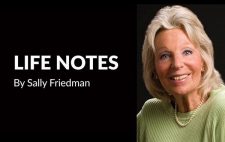It was semi-hidden deep in the back of a spare room that has become a domestic catch-all on the second floor of our house. The sight of my late mother’s handwriting on a cardboard box tied with string stopped my heart.
I hadn’t seen that scrawl in the more than 10 years since we’d gone through that saddest and hardest work of adult children after a parent’s death: the sorting out of a life. We’d dutifully donated, divided and thinned the herd, but somehow there was this single carton buried in that black-hole room.
“Are you sure you want to do this now?” my husband asked, no doubt seeing the stricken look on my face that he knows so well when it comes to my facing things I dread. But I’d already tugged at the strings on the carton. I was plunging in.
Those who have been there may recognize the sense of mixed sadness and curiosity in this scenario. I looked down and saw that my hands were trembling.
The first thing I came to was an envelope that held the endless medical billing records that had come in an avalanche with mom’s final illness. How had she ever managed to keep up with the forms, the medical lingo, the insurance jungle, the cold language of advance directives?
The next few items left the same feeling of loss – and wonder – of that terrible time when mom pushed through a last battle with lymphoma, the marauder that had returned to haunt her after a long absence. But she still managed to schedule a few dinners out with her friends, as duly noted in her little Hallmark datebook. And she had even gone to the gym a few times.
The going got really rough when the more personal things emerged.
A simple envelope held not just a copy of my wedding invitation, now 57 years old, but also a tiny piece of my wedding veil lace attached. Who knew how sentimental mom was. Practical was more her vibe – or so I thought.
Neatly arranged in a leather purse were mom’s credit cards. I could picture her in her sensible SAS shoes, searching the aisles of her favorite department stores on long, lonely days in her last years, but hesitating to buy anything that wasn’t on sale. Mom had a Great Depression mentality that kept her from even modest self-indulgences. I should have bought her those indulgences just because.
And who knew that mom had kept every note and card that her great-grandchildren had sent her, often signed with crooked rows of those “xxxx” kisses. Suddenly, I could picture mom at the mailbox in her Philadelphia high-rise lobby, opening those envelopes right then and there.
Why hadn’t I sent her little notes instead of favoring rushed phone calls in my kitchen as I made dinner?
I felt the same guilty pang when I opened a small manila accordion file in which my mother had alphabetically arranged all those ID cards we all seem to collect, the ones that define who we are in that indifferent world out there.
Cartons tell stories. Mom had saved the thank-you notes sent to her by a local charity she had quietly supported, evidently for years, giving what she could. Who knew?
And who knew that close to the end of her very long life, a man named Max had sent my twice-widowed mother sweet, touching messages about nothing – and everything – from the weather to plans for a lunch date. I’d met Max, her “gentleman caller,” and loved their late-in-life connection, but never imagined that there was caring at the end of both their lives.
Ultimately, I discarded nothing except the credit cards in that little purse, which I dutifully cut up lest they ever fell into the wrong hands. But somehow, I couldn’t get myself to leave that room. It held a whole new meaning for me, one wrapped around memories of a woman I miss so much – and always will.
And then I gently put everything back into an ordinary, extraordinary carton tied with string.











